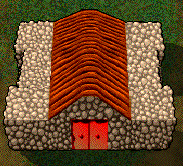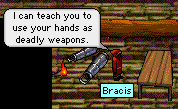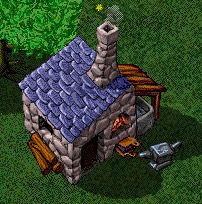Training
Quick Links to CLUMP Content
10 Things for Newbies | Basic Game Mechanics | Creatures | Fighting | Group Hunting | Healing | Mystics | Macros | Tactics | Index | Links
Instead of levels, Clan Lord has small increment training in one trainer at a time. It is very common to have some exile train 300 or more ranks of any trainers. There is no way to find out exactly how many ranks someone has. So, in order to know your exact rank count, you have to count them yourself, or you can save your text log files (under options) and use an app like Scribius to automatically count them. This section will only focus on non-fighter specific trainers, Secondary profession trainers like baking, brewing, and tailoring will be touched upon. If you do plan to learn a secondary skill or profession, do it early in your career when ranks come fast and easy, because they don't increase your slaughter as much as ranks used to improve fighter, healer or mystic skills specific skills.
Temple Trainers

Temple Trainers are the ones that stand in the Temple just north of Town Center (TC). New exiles often emerge here after setting their appearance. These are among the first trainers an exile can visit. Which one(s) to pick training will depend on which class you are going to be.
The Three Trainers are Bodrus, Spirtus and Mentus.
Bodrus

Bodrus is a mixed trainer, teaching a combination of all the first and second circle fighter trainers. Non-fighters may wish to train with Bodrus to increase their accuracy, defense and health. Training with Bodrus can, however, decrease their number of swings. Non-fighters are able to study 100 lessons before reaching the cap. Since Bodrus is a less effective version of Evus, most fighters prefer to study with Evus.
There was a time when ten lessons with Bodrus were necessary before an exile could seek out the person who would give them a dagger and make them into a fighter. Nowadays, the ten lessons can be with anyone, and suggestions for studies may include Troilus, Skea Brightfur, or Pathfinding.
Spirtus

Spirtus is a mixed trainer, similar to Sprite. Spirtus lives in the Temple and is available to all exiles, while Sprite lives in the Healer Temple. At one time Spirtus taught a little of the four first circle healer trainers, but when Sprite came along and took over those duties, Spirtus stopped teaching spirit recovery. In addition to the healer trainers, Spirtus also teaches what is commonly known as Rodnus--the ability to be healed faster.
Spirtus can be trained by all professions and the professionless, but fighters should understand that training Spirtus will mean they will not be able to get full Rodnus training when they reach fourth circle. Some fighters also feel that it is a waste to train with a trainer that has some things they cannot use, such as Faustus. Other fighters want to get more Rodnus than Rodnus himself will train, and decide it is worthwhile to train some Spirtus as well. Most healers prefer Sprite because of the spirit recovery.
Mentus

Mentus is used by everyone to do a number things: decrease the amount of sunstone wear every time it's used, decrease the chance of an ethereal portal stone (EPS) breaking on use, use certain magical devices and to avoid death caused by some magical items. Mentus decreases the damage taken by using the movable portal (Currently in whatzit seller shop by boats in west town and in CD.)

Also helps you resisting black poppies in Tenebrion’s keep and elsewhere. It could cause you to create black poppies when you're fallen in one place for a long time -- (This last bit of info is probably out of date). Mentus has no known effect on opening pathfinding paths.
For Mystics, this is the first trainer they should visit before they become an apprentice since it increases their base powers. Some mystics have publicly stated that they have well over 300 ranks in Mentus which allows them to become more powerful mystics later on.
Open Trainers
Open Trainers are ones that allow anyone of any profession to train in them. Because of this some are capped anywhere from 50 to 100 trainings. The down side to each of these trainers is that a rank trained in a non-fighter specific trainer is the rank that could have gone into making the person a better fighter. Thus some fighters, refuse to train anything but Fighter trainers and Troilus. Also, with the exception of Troilus, open trainers raise slaughter the least. So, it's better to train these trainers early on in your career, when ranks come fast and easy.
Troilus

Troilus training allows one to heal faster without the aid of a healer. It takes a significant amount of troilus to be able to self heal as fast as even the slowest healers. However, for solo hunters who wander without someone to heal them and other exiles whose healers have fallen, a decent amount of troilus is a very effective way to stay alive in dire situations if that person can get to a safe area and stay long enough. Troilus is popular with fighters that wish to be able to survive either solo or group hunts where healer resources get overburdened. The biggest down side is that troilus raises slaughter about as much as the highest slaughter fighter trainers.
Loovma Geer

Loovma Geer works in the smith shop, and he teaches exiles how to take better care of metal items that are subject to wear — specifically: armor, the chain and the shiny dagger. If any exile chooses to be a chainer, use armor, or use a shiny dagger, a decent amount of Loovma Geer is essential to keep the costs of repairing these items down. A broken chain can be fixed for 500 coins and two metal. Armor can be quite expensive to repair — in the thousands — and without loovma, armor will wear more often and can quickly put a fighter with a modest income in the poor house.
Pathfinding

Pathfinding (PF) allows exiles to use shortcuts to get places quicker, and at higher amounts allows them access to places impassable by non-Pathfinders. At higher circles fighters may find themselves unable to join a party without a pathfinder to let them in, and often times, they'll miss out on good solid experience opportunities because of their lack of PF.
Because of this, it's important to some people to train Pathfinding, because they want to be able to go almost anywhere. Rescue healers, and those interested in exploration would do well to study PF. Also, groups interested in exploration often take more than one pathfinder ("PF" as well) with them, which gives lower level exiles a chance to hunt with groups they wouldn't be invited to join otherwise.
Skea

Skinning is taught by Skea Brightfur in West Puddleby. Skea gives you a greater chance to skin a creature with fur after you kill it. Even an exile with no skea has a chance to skin creatures, but the odds are very low. The more skea one has, the greater the chance of skinning a creature successfully. These furs are instantly converted to coins you see falling into your pack.
If you're at the level where you can successfully kill a creature, but are ruining a lot of furs, skea will allow you a greater chance to skin and your purse to expand much more rapidly.
Good skinners who may be too weak to go to a higher level area are sometimes invited by exiles just to skin. If the skinner doesn't hit the creature, in order for him/her to attempt to skin the creature, an exile who has hit the creature must be sharing with the skinner. Thus even if the skinner never tags a creature, they can gain shared experience and advance rapidly if all the fighters are sharing with the skinner.
In some cases skinning give a small amount of experience to a skinner for skinning a creature.
Dentir

Dentir is exactly like Skea, but instead of furs, Dentir allows the pulling of teeth and insect pinchers from slain creatures. There are few creatures with teeth worthwhile to pull. These are the insect and arachne races — including Arachnoids and Scarmis.
Bracis

Bracis is unique among the trainers because he's the only offensive trainer anyone can train. He teaches any exile how to use bracers. Because he's open to everyone, his training cap is very low, but sufficient enough to give non-fighters some ability to defend themselves against small animals and weaker creatures. Since fighters can gain greater abilities than the cap on Bracis, it is inadvisable to train Bracis if you are a fighter.

Master Janis’ Mental Mysteries
Master Janis’ Mental Mysteries is a book hidden deep within the pitch/slate caves. Each chapter studied expands a person’s maximum /thinkgroup by 1.
Language Trainers
The Language Trainers teach an exile how to speak languages other than common. For your own race it takes 5 ranks to learn the language. For other languages it costs 25 for the first foreign language and 15 for each language after the first. For humans all foreign languages are 15 ranks to train. Using these additional languages is completely optional, however most people do know their own race language at the bare minimum because the cost is so low.
To speak a language you've learned you type /speak {language} and then the text. You will continue to speak that language until you change to another language. to go back to the common tongue type: /speak common.
Profession Trainers
Profession Trainers teach things that you cannot use in the field or give you no advantage during a hunt and can be used to make money or simply to provide a valuable service. These are skills that anyone can learn that cost real ranks. Thus mystic only abilities do not fit here. Nor does anything you need no training to do, such as Kudzu farming: while it can make you money, there's no way to train to get better kudzu yields. Things such as phantasms?, while they are trainable, serve no known purpose, and will not be covered in the main sections for now.
Professions include:
Alchemy
Alchemy is the act of making potions. From speed potions to more common red healing salves. Each potion requires training to make. It takes a quest to enable one to make potions and certain potions are only craft-able by certain professions, such as red healing potions and salves that are only craft-able by healers.
Baking
Baking allows one to make cookies, cakes, pies and other food. The training is capped and very low. The Bakery is in the east side of central Puddleby.
Blacksmithing

The Blacksmith has three functions (see Smithing in Make Page)):
The Smithy is directly adjacent to the Fighter hall in the NE corner of N Town, and contains the following NPCs that pertain to the Blacksmith profession:
- Forgus: Trains exiles in the art of Blacksmithing. (NOTE: Capped at 1100 ranks.)
- Whetka: Sells exiles Blacksmith Repair Kits and the corresponding supplies.
- Zonbre: Looks up the components required to make a given blacksmith-made item.
- Smithy Gefor: Prepares the forge for the Blacksmith to make a given blacksmith-made item.
- Powean: Studies new and exotic blacksmith-made items.
- Pepla Tonew: Looks up the components required to smelt a given type of ingot.
- Nafurce: Prepares the crucible for the Blacksmith to make a given type of ingot.
- Lyzer: Studies new and exotic ores.
Brewing
Brewing allows one to make beer and wine. There is a cap on lessons and it is very low. The Brewery is located in West Puddleby.
See Brewing's how to and where to find ingredients.
Metallurgy
Metala teaches you how to smelt a Piece of Iron from Iron Ore and how to make various ingots (gold, tin, copper). She is a dwarf who can be found in the northwest room of the ? Smith ?. She is an uncapped trainer. The more you train with Metala, the more likely you will be successful in smelting the item you desire?? In the same room as Metala you can find Peplaw Tonew who will provide the recipe of any item you may wish to smelt. Finally in that same room is Lyzer who will study new ores brought to him to determine how to smelt them.
The recipes Peplaw Tonew lists and their requirements are:
- Piece of Iron = A lump of iron ore.
- Gold Ingot = A lump of gold.
- Tin Ingot = A lump of tin.
- Copper Ingot = A lump of copper ore.
In order to smelt an item, you must first ensure you have the correct ingredients in your pack. Then you go to Nafurce in the same smelting room and tell him what you wish to make. Once you do that, you walk up to the Smelting Furnace and begin working.
- The question is, do the ranks you have determine the chance of your success?
NOTE: Metallugy has been rolled into Balcksmithing.
Tailoring
Sartorio is the brightly dressed fen who trains tailoring. He can be found in the northernmost room of the Cote' Daiur in northwest town. Sartorio is not a capped trainer so you can continue to train with him as long as you like. Sartorio teaches you how to mend cloaks, shoes, shirts, pants and parachutes. The more ranks you have with Sartorio, the fewer supplies you will require to mend an item.
How Mending works
 see details on how to mend cloths.
see details on how to mend cloths.
Tailoring requires a level of trust between the tailor and the exile as items must be given to the tailor in order for mending to occur. Also tailors set their own price - as they can charge more than the amount required in supplies to fix an item. So some exiles may get a better deal with one tailor versus another. Other tailors will quote the exact price to fix an item and will accept tips. Since the cost of mending an item goes down with the skill of the tailor, this is one profession in which select exiles will specialize.
Woodworking
Woodworkers can make items such as brooms, shovels (with a shovel blade made by a blacksmith), and other items. The woodworking trainer is hidden on the island of Puddleby.